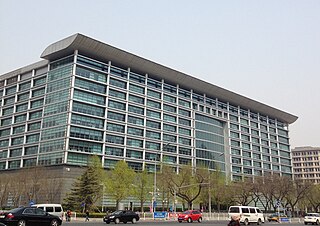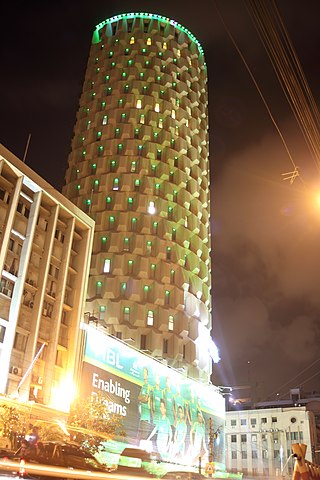
The People's Bank of China is the central bank of the People's Republic of China. It is responsible for carrying out monetary policy as determined by the People's Bank Law and the Commercial Bank Law.

The Industrial and Commercial Bank of China is the largest bank in China and in the world, by total assets. ICBC was created on 1 January 1984 from what were then the commercial banking operations of the People's Bank of China. ICBC is majority-owned by the Chinese government and has remained so after its landmark initial public offering in 2006. As of end-2021, ICBC shareholders included Central Huijin Investment, the Chinese Ministry of Finance, the National Council for Social Security Fund, adding up to 69.3 percent under the ultimate control of the Ministry of Finance.

The State Bank of Pakistan (SBP) is the Central Bank of Pakistan. Its Constitution, as originally laid down in the State Bank of Pakistan Order 1948, remained basically unchanged until 1 January 1974, when the bank was nationalised and the scope of its functions was considerably enlarged. The State Bank of Pakistan Act 1956, with subsequent amendments, forms the basis of its operations today. The headquarters are located in the financial capital of the country in Karachi. The bank has a fully owned subsidiary with the name SBP Banking Services Corporation (SBP-BSC), the operational arm of the Central Bank with Branch Office in 16 cities across Pakistan, including the capital Islamabad and the four provincial capitals Lahore, Karachi, Peshawar, Quetta. The State Bank of Pakistan has other fully owned subsidiaries as well: National Institute of Banking and Finance, the training arm of the bank providing training to Commercial Banks, the Deposit Protection Corporation, and ownership of the Pakistan Security Printing Corporation.

BankIslami Pakistan LTD. is a Pakistani Islamic bank based in Karachi, Pakistan. It has 400+ branches in 150 cities in Pakistan. It is the first Islamic commercial bank to receive the Islamic banking license under the Islamic banking policy of 2003 from the State Bank of Pakistan on March 31, 2005. The bank started its operations on 7 April 2006 and offers shariah-compliant retail banking, investment banking, consumer banking, and trade finance products. The bank intends to focus on wealth management as the core area of business and plans to soon launch proprietary products and integrated financial planning services. The bank has a nationwide presence. With the amalgamation of KASB on May 7, 2015, all 104 branches of KASB have become part of BankIslami’s branch network. BankIslami is now the 11th largest banking network in the country. The idea of BankIslami was conceptualized by Jahangir Siddiqui & Company Limited and Randeree family in late 2003. Mr. Hasan A. Bilgram I. was appointed as adviser to the sponsors on 16 March 2004 to formalize the idea. He presented the concept paper of BankIslami to sponsors on 24 March 2004. A detailed business plan was then prepared and a formal application was submitted to the State Bank of Pakistan on 26 May 2004. On the 26th of September 2005, Dubai Bank joined the sponsors and became one of the founding shareholders of BankIslami by investing 18.75% in the total capital.

Habib Bank Limited abbreviated as HBL, is a Pakistani multinational bank based at Habib Bank Plaza, Karachi, Pakistan.
China's banking sector had CN¥319.7 trillion in assets at the end of 2020. The "Big Four" state-owned commercial banks are the Bank of China, the China Construction Bank, the Industrial and Commercial Bank of China, and the Agricultural Bank of China, all of which are among the largest banks in the world As of 2018. Other notable big and also the largest banks in the world are China Merchants Bank and Ping An Bank.
Humayon Dar is the director general of the Cambridge Institute of Islamic Finance, a research institute specializing in the financial sectors of the countries with significant proportion of Islamic banking and finance.

The Institute of Bankers Pakistan (IBP), established in 1951, is Pakistan's premier banking training institute, which aims to develop and groom a cadre of banking and financial services professionals on continuous basis. It is an ISO-9001-2000 Certified Organization. IBP has its head office in Karachi.
Muhammad Imtiaz Alam Hanfi was a Pakistani banker who served as the governor of the State Bank of Pakistan (SBP) and has been part of various government committees, including the Planning Commission. He was the first central bank governor in the country who came from within the State Bank of Pakistan and not belonging to a political party or international bodies like IMF etc.
The National Institute of Bank Management is an autonomous institute located in Pune, India. It is an autonomous, apex institution for research, training, education and consultancy in bank management.
Syed Salim Raza is a British Pakistani banker and financier who served as the 15th Governor of State Bank of Pakistan. In September 2018, Raza was appointed to the Economic Advisory Council (Pakistan), the Prime Minister's Economic Advisory Council.

Yaseen Anwar is a Pakistani-American banker who had been the Governor of the State Bank of Pakistan from 20 October 2011 to 31 January 2014. He previously also acted as deputy governor and has 33 years of experience in international banking. Anwar holds a dual Pakistan and US citizenship. He is a graduate of the Wharton Business School at the University of Pennsylvania.

JS Bank Limited (JSBL) (جے ایس بینک لمیٹڈ) is a Pakistani commercial bank headquartered in Karachi, Pakistan. The bank is a prominent majority-owned subsidiary of JS Group. The bank was established in April 2007 as a result of the merger of two mega corporates, Jahangir Siddiqui Investment Bank Limited and American Express Bank. JS Bank Limited currently operates branches across Pakistan, as well as an international branch in Manama, Bahrain.
The Pakistan Technical Assistance Programme (PTAP) is a bilateral and multilateral assistance programme, primarily responsible for administering civilian foreign aid to other countries. The programme functions through administrating the financial donations, industrial training, and expertise to developing countries to the partnering nations who have foreign relations with Pakistan. Since its inception in 1950s, the programme distributes foreign aide that covers 65 developing countries including from Middle East, East Asia, Africa, and Latin America.

The Financial Monitoring Unit is the Financial Intelligence Unit (FIU) of Pakistan established under the provisions of Anti-Money Laundering Act, 2010. It is an independent intelligence service department of the Government of Pakistan and primarily responsible for analyzing transactions, money laundering cases, building efforts against the terrorist financing, and all sorts of financial crimes within the jurisdiction of financial laws of Pakistan.
Ashraf Mahmood Wathra was the 18th Governor of State Bank of Pakistan. He was appointed as the State Bank Governor on 29 April 2014 and served until 28 April 2017.
Pakistan's e-trading mainly involves buying and selling goods, and services using internet or telephone, through the use of electronic means such as computer, fax machine, cellular phone, automated teller machines (ATMs), and other electronic appliances with or without using the internet. Online banking, e-tickets, share trading in stock exchange are few examples of e-commerce of modern advancement. With its potential, e-trading can reduce the cost per transaction, increase efficiency, support contest, lower prices and boost international demand. It can open new areas for business in the service sector like online education, medical services, consultancy, and data exchange. It can also provide expansion in trade through domestic and international market research, advertising and marketing. In the financial services area, it can make easy and speedy transactions and transfer of money at a minimum risk. The interesting feature of online trading is that an investor simply sitting in his office or home can buy or sell through the Internet via mobile/tablet or PC and before being an experienced trader he may learn a lot by watching market screens or web portals at his convenience.









